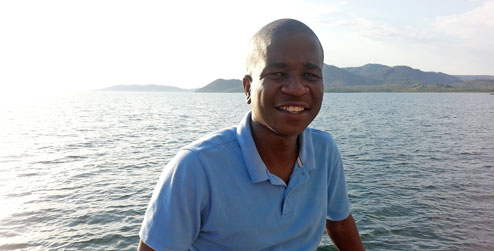 Kuziva, from Zimbabwe, works as an Information Technology, Documentation and Communications Adviser, alongside various partner organisations in Zimbabwe, under the Comic Relief funded project Hear Our Voices – Speak Out for HIV and AIDS Services.
Kuziva, from Zimbabwe, works as an Information Technology, Documentation and Communications Adviser, alongside various partner organisations in Zimbabwe, under the Comic Relief funded project Hear Our Voices – Speak Out for HIV and AIDS Services.
What is your work background?
I have previously worked with non-profit organisations in the water and sanitation sector documenting best practices and community-based efforts to access safe drinking water and decent latrines. Prior to joining Progressio, I was a Senior Web Specialist with a Harare-based communications agency, developing sustainable internet solutions for non-profit organisations.
What inspired you to become a Development Worker with Progressio?
Progressio believes in what I believe in – capacity building at grassroots level. I was inspired by Progressio’s approach to working with the poor in communities. I had documented numerous marginalised rural communities and their determination to overcome the challenges that kept them poor. I had seen rural women being trained and building toilets for their households, restoring dignity to their families. I had seen children orphaned by HIV establishing nutrition gardens and feeding their siblings. I wanted to share my skills with the poor, so they increase their capacity to communicate issues that affect them and transform their lives.
What do you enjoy most about your role?
I enjoy the unique opportunities to integrate information technology into development work. I enjoy most when I train older staff members from partner organisations to use computers and the internet to do tasks that would otherwise have taken them a lot of time. Their ‘aha moments’, accompanied with generous smiles, gives me so much pleasure. Of course, I understand, they were born ‘BC’ – before computers.
What has been the most exciting moment so far?
It’s difficult to rate which moment tops the list of most exciting, but one moment crosses my mind. Late last year, I was scheduled to train staff (mainly truck drivers) from the National Employment Council for the Transport Operating Industry (NECTOI) on using Windows 7 operating system. About 25 participants had signed up and I wondered how I was going to handle the training. I knew the organisation had at most three laptops. When I got to the training venue my counterpart had set up about seven desktop computers in the boardroom. Cables were all over the floor. I never thought he could be so resourceful. Mr Rogers, one of the managers, was touched by such innovation and the zeal of the participants to proceed with the training despite inadequate resources. He asked my counterpart to compile a list of all the people who needed laptops, so he can arrange purchasing. It was an exciting moment to see a very basic training making an unprecedented impact, i.e. the management of NECTOI buying laptops for their staff.
And the biggest lesson?
I have learnt to listen before I give advice. I realised people will not care how much you know until they know how much you care. You should be willing to listen and understand their situation before you suggest your prescription. Only then will they appreciate your advice.
What is the biggest change you have witnessed since starting your placement?
All the four partner organisations now have database driven websites, which they update themselves. They can now tell the world their own stories and advocate for change. Some of the partners, for example the Zimbabwe National Council for the Welfare of Children, have managed to collaborate with regional partners who have contacted them through their website. Increased visibility through their websites has also helped the partner organisations with their fundraising efforts.
What is the biggest development challenge facing Zimbabwe?
Zimbabwe is facing rising levels of poverty. The country’s economy has been on a downward trend for more than a decade. The rising poverty levels are making more and more people become vulnerable and engage in risky behavior, reversing the gains made in combating HIV and AIDS.
What strikes you most about Progressio’s Development Worker model?
Progressio’s Development Worker model is a complete departure from the traditional modus operandi where international organisations are seen at the fore-front of advocating on behalf of local partners. The Development Worker model capacitates local partner organisations so they are able to tackle issues that affect their communities, even after Progressio has left. This strikes me the most.
What advice would you give to someone who is thinking of becoming a Development Worker?
Development work is about giving - yourself, your talents and your skills - to make a difference. If you enjoy giving, development work will definitely give you enormous opportunities to do this. You may not change the world but you will definitely make a world of difference to under privileged communities.
Where do you see yourself once your placement has ended? And in what ways is this placement with Progressio assisting you to get there?
I am sure there will always be opportunities to give myself, talents and skills for the betterment of communities. I will only be smarter, thanks to Progressio.


